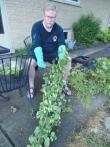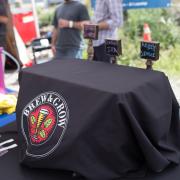I just read about something that had never occurred to me - not heating your sparge water. Denny Conn waded into a thread on homebrewtalk.com and blew my mind. Others chimed in and a couple of folks confirmed that was their practice.
I have deep respect for Denny - he wrote the most concise and clear approach for the new brewer who wants to batch sparge. When I was transitioning from extract to all-grain, before I knew anyone else who brewed, I read a bunch, got really confused, then read Denny's primer. The heavens parted and I knew what to do. You can read his batch sparging primer here. Since then, I've gotten to visit with Denny a few times and judged with him at a competition in St. Louis last autumn. Like I said, I respect him tremendously.
In any case, here is the thread on homebrewtalk about it. I don't know if I'm going to try this or not, but with our super-dooper double water heater, using water straight from it is certainly an option. pH isn't as much an issue with batch sparging as it is with fly sparging, so that's not an issue. Increases your time to reach a boil, perhaps, and *might* decrease efficiency, although it shouldn't if you've got full conversion.
I suppose a bunch of you are going to say "of course, I do that all the time" but for me, it was new info.
Old dog, new tricks.











Wow, pretty interesting information here, Jim! Thanks for sharing.
On page 2 of that thread, Denny says:
"Well, maybe room temp as opposed to cold, but yeah, in general that's true. Some people feel like using hotter water dissolves more sugar into it, but that doesn't happen until you hit the limit of solubility of the water you're using. But that doesn't happen til you hit a gravity of 1.300! If your gravity is under that using hotter water will not dissolve more sugar. I use 185-190 sparge water, but that's to eke out all the conversion I can, not to dissolve more sugar into it."
I find that curious because there's a lot of talk about the benefits of batch sparging and that it doesn't dillute the buffering power of the grain (Unlike fly sparging, which dillutes the buffering power and can lead to a higher pH. Higher pH = more tannin extraction). But isn't is common knowledge that water over ~170F during the sparge (either fly or batch) can lead to tannin extraction as well?
Brandon, that is correct. However, I believe the amount of time will affect the amount of tannins that are extracted. 15 minutes of batch sparging will either not extract the tannins or extract so little that you can't notice. However, 60-90 minutes exposure to hot water (even mash temps) will extract a noticeable amount of tannins.
Brandon, unless you are brewing a stupid pale beer beer with monstrous efficiency and sparging really hot, it's unlikely that tannin extraction can occur on the homebrew scale. The generally accepted number you are looking for is a final runnings gravity of 1.008 w/ a PH of 6+, which, on our Chaos equipment, isn't really all that easy to achieve no matter what you do.
That being said, if it really bothers you, 1 ml/gal of 88% lactic will probably fix you right up if you're doing a really pale lager.
EDIT: For what it's worth, heating sparge water at Chaos may be necessary to accelerate the cook-off of those soluble chlorines.
And, I should clarify that I was talking about roasted grains, not regular mash grains.
I should also point out in the quest to reduce tannins in beer is that the presence of tannins helps precipitate the hot break, and is also a very important component in flavor for stouts and porters.
Queue me lautering my mash with the warm chiller water.
thank you for sharing
Good info, thanks Jim, I definitely like the "one-pot" approach and will give it a try. Easy as Hamburger Helper.
I will throw this into the mix. Different types of sugars are released from the grains at different temps. I look at it like an elevator going up. Down low you get all the sugars that the yeast will eat up easily... 122-140. As you step the mash up to 140-150 you start to pick up other fermentable sugars. As you start to get into the high 150s-60's you get sugars that will not be eaten by the yeast and they will remain. Your recipe will dictate what type of mix of sugars you're trying to collect. How your beer will dry out and what if any sweetness is left over. Is this old school now?
--james
Boolish, tannin and astringency are not that uncommon in homebrewed beers, unfortunetly. In competitions, I run into it regularly.
I agree with you, Brandon, I wouldn't do what Denny is doing with those high sparge temps. Probably ok because of the pH, but why risk it for a few efficiency points?
www.singingboysbrewing.com
@Jim V That's surprising to hear because even I, the Sarge of Sparge, don't think I've ever experienced that in one of my homebrews (aside from over-hopping, but that's not pertinent to this conversation). Could it perhaps be due to the changes in the pH? Is there any way to tell if it's due to the temp or the chemistry of the water?
Just to corraborate Jim V., yes astringency is a common off-flavor. What the most common cause of its genesis is, I couldn't tell you.